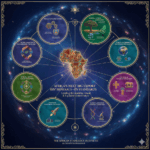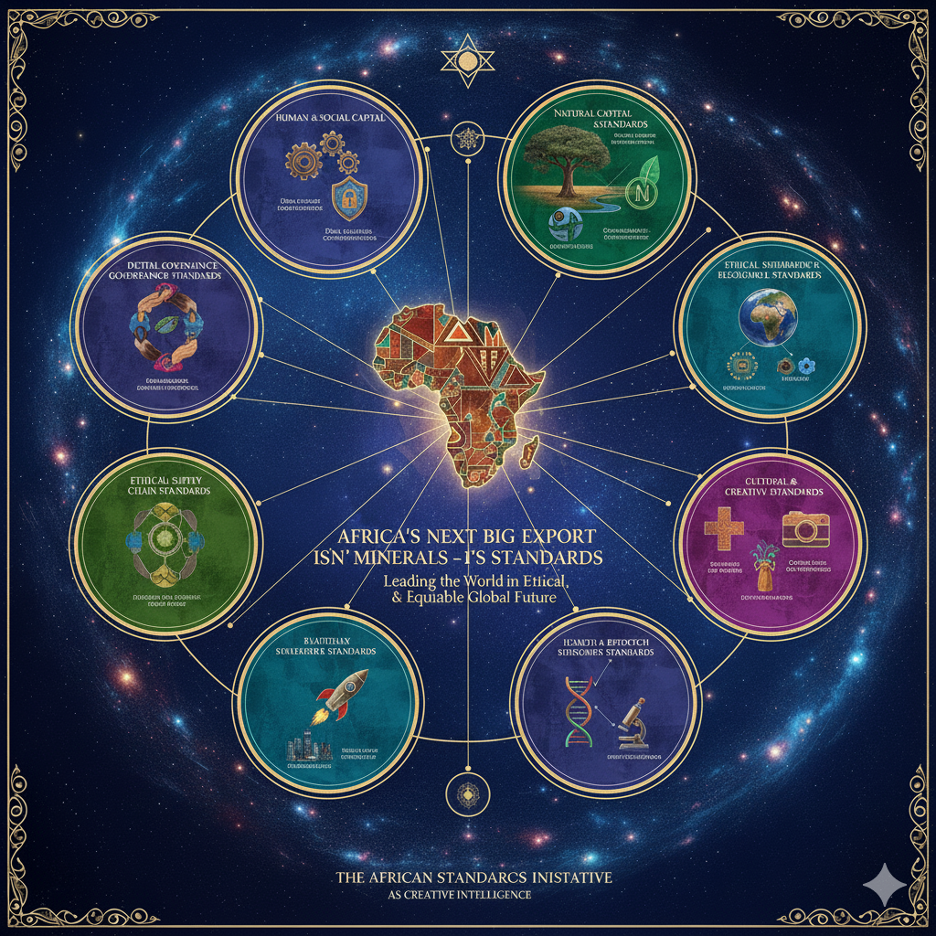
A business case for Africa Ubuntu Standardisation (AUS) in the age of AI, trade and sovereign data
1. Africa’s UN moment, and what it means for markets
At the 80th Session of the UN General Assembly on 25 September 2025, President John Mahama delivered a message with clear implications for investors, regulators and African industry: “The future is African.” He anchored that claim in demographics and economic renewal, arguing that by 2050, more than a quarter of the world’s population—and a third of all young people—will live on this continent. He then pressed for reforms to the multilateral system and the global financial architecture, insisting that Africa must move from the periphery to a co-author of the rules that govern value creation and trade. “If not now, then when?” he asked of permanent African representation on the UN Security Council, before calling for a reset that matches the new realities of technology, climate and economics.
For Ghanaian and African businesses, the subtext is practical: we will not realise that future by exporting raw materials under other people’s rules. We will realise it by exporting trust—codified as African standards that reward quality, integrity, safety, and data sovereignty. That is the animating purpose of Africa Ubuntu Standardisation (AUS): a homegrown, trade-ready system that mirrors the best of ISO/IEC but is written for Africa’s economies, our languages and our values.
2. Why standards—not subsidies—unlock Africa’s competitiveness
Standards are the hidden infrastructure of commerce. They determine who is bankable, which products clear customs without friction, how quickly supply chains recover from shocks, and whether digital services can scale without breaching privacy or intellectual property. When those standards are authored elsewhere, African firms pay twice—first to comply, then again in the opportunity cost of models that ignore indigenous methods, informal sector realities and local languages. AUS corrects this by placing Ubuntu (community good), Sankofa (refine what works), Ma’at (balance and truth) and stewardship of land and waters at the heart of quality and governance.
AUS is designed for the full economy, from mines and ports to fintech, creative industries and traditional medicine. It uses a familiar numbering to speed adoption—AUS-9000s (quality), 14000s (Afro-ecology), 27000s (data/AI sovereignty), 30000s (governance & anti-corruption), 70000s (traditional medicine), 80000s (blue/green economy), 90000s (creative & cultural)—but adds African clauses that matter for risk, cost and trust.
3. Trade-ready governance that investors can underwrite
The governance is simple and credible. An AUS Council (AUSC) sits at AU level with ARSO in the lead, working alongside the AfCFTA Secretariat, AU sector councils, REC standards bodies (ECOWAS, EAC, SADC, COMESA), academia, private sector, civil society and custodial authorities. Fifteen technical committees mirror Africa’s real economy—from TC08 Transport & Ports to TC11 Digital, Data & AI and TC15 Informal Economy & MSMEs—while an AUS Accreditation Board (AUSAB) licenses certification bodies and labs. Interoperability is built in: AUS publishes equivalence maps to ISO/IEC, supports dual-badging where markets require it, yet maintains non-negotiable sovereignty clauses on data residency, FPIC (free, prior and informed consent) and community benefit.
4. Flagship standards that change firm-level economics
Twelve first-wave standards can move the needle immediately. AUS-9001-UQMS (Ubuntu Quality Management Systems) treats quality as “fitness for community good,” measuring grievance resolution time, apprentice-hours and local sourcing alongside defect rates and on-time delivery. AUS-27001-AIDSS (African Information Data Sovereignty & Security) mandates African data residency by default, encryption, audit trails and DID watermarking for AI media, with model cards and explanations in local languages. AUS-70001-TM-Safety protects patients and custodial knowledge in traditional medicine through FPIC and benefit-sharing. AUS-80001-Blue sets measurable duties for fisheries, ports and marine conservation so coastal communities participate in—and profit from—trade.

The commercial effects are straightforward. A Tema terminal certified to AUS-80001 can evidence lower operational risk, stronger ESG credentials and predictable community relations—signals credit committees reward with cheaper capital. A cocoa processor aligned to AUS-21001-AgroSov proves soil health and climate resilience, clearing AfCFTA procurement faster and commanding better terms from corporate buyers. A health clinic meeting AUS-70001 reduces malpractice risk and opens new insurance and export channels for approved herbal products.
5. Certification that includes MSMEs instead of excluding them
AUS offers two pathways: conformance (pass/fail) for regulated markets, and a maturity ladder (L1–L5) for improvement journeys. This ladder is MSME-friendly: firms can start at L1 (awareness) and climb to L5 “Ubuntu Excellence,” proving community value and operational resilience with simple, auditable evidence—often in local language. Audits blend documentation, site observation, data checks and community verification hearings. Certificates carry an AUS-Mark with region tag (e.g., ECOWAS/EAC) and sit on a public, tamper-evident registry with QR-linked KPI dashboards—radically improving market transparency and de-risking procurement.
6. Data & AI sovereignty as a balance sheet asset
President Mahama warned that today’s world is shaped by “cryptocurrency, Artificial Intelligence, social media… and the dark web,” urging a systemic recalibration that protects peace, representation and truth. He cautioned that digital systems can create “the illusion of connectivity” while feeding disinformation and division, and pressed for sovereign equality in the rules that govern power. Those points translate directly into enterprise risk: unsovereign data increases breach exposure, vendor lock-in, regulatory uncertainty and reputational harm.
The AUS-27000s series turns sovereignty into controls investors can price: data residency in Africa by default; cryptography and role-based access; auditable logs; model transparency in local languages; FPIC registers; and sacred-exclusion zones for datasets. For CFOs, this reduces compliance drag across multiple jurisdictions; for CTOs, it clarifies architecture (on-prem or AU-certified sovereign cloud for public and critical systems); for boards, it hardens lines of accountability that ratings agencies and limited partners increasingly demand.
7. Interoperability, AfCFTA scale and the 18-month path to impact
AUS is WTO-TBT compatible and publishes bridge documents so exporters can demonstrate “AUS ≈ ISO+” without duplication. The AfCFTA can adopt AUS as the default for continental procurement and product labelling, aligning incentives across 55 markets and lowering the cost of cross-border compliance. A realistic timeline sees Phase 1 (0–3 months) constituting AUSC/TCs and selecting pilots in ports, mining, agro-processing, hospitals/TM, construction and software/AI; Phase 2 (4–9 months) drafting the twelve flagship standards, training the first 500 auditors and launching the public registry; and Phase 3 (10–18 months) finalizing v1.0, signing mutual-recognition MOUs and mainstreaming MSME on-ramps in 20 countries.
Measured well, the system pays for itself. System KPIs include the share of firms at L3+, reductions in audit cost/time, growth in women- and youth-led certified firms, uplift in a Community Value Index, coverage of local-language controls, signed FPIC agreements, and incident reductions in safety, environmental harm and data breaches.
8. A rules-based renaissance investors can believe in
Africa’s case at the UN was—notably—about rules as much as resources. It called for representation, fairness and a reset in the systems that shape prosperity. “The future is African,” President Mahama said, repeating the line “a little louder for the people in the back,” and insisting that Africa’s authorship of what comes next must be “huge” and “consequential.” AUS operationalises that leadership where it matters for markets: in factory SOPs and port manifests; in board risk registers and procurement portals; in model cards and audit trails. It converts a political thesis into bankable practice.
If Ghana and peer economies move now—mandating AUS for selected public tenders, allowing dual-badge AUS+ISO for exporters, and tying concessional finance to AUS L2+ maturity—the continent will start exporting more than gold, cocoa or lithium. We will export credibility, backed by standards that align profitability with dignity and sovereignty with scale.
The point is not to reject global norms. It is to participate at eye level—with our own rulebook. In an age when algorithms move markets and data is a factor of production, the countries that prosper will be those that can prove trust at speed and at scale. AUS gives African firms that proof—and gives investors a clearer line of sight to returns that are resilient, equitable and authentically African.
“In many ways, the United Nations is the proverbial town square of our modern global village,” President Mahama said in New York. The same must become true of Africa’s marketplace: open, fair, and governed by standards that reflect who we are and where we are going. If not now, then when?
*********
Dr. Dr. David King Boison is a leading AI strategist and educator driving Africa’s transformation in the Fourth and Fifth Industrial Revolutions. Author of The Ghana AI Prompt Bible, The Nigeria AI Prompt Bible, and advanced guides on AI in finance and procurement, he champions practical, accessible AI adoption. As head of the AiAfrica Training Project, he has trained over 2.3 million people, including 1 million professionals in 15 countries, toward his bold target of 11 million by 2028. He urges business leaders to see prompt engineering as the next frontier of competitiveness. Contact: kingdavboison@gmail.com | aiafriqca.com. For enquiries on Ai Master Training contact: +233 207696296/559853572. Email: aiafricastimulus@gmail.com…Web: https://aiafriqca.com/
